| Game Details | |
|---|---|
| Name | The Estates (2018) |
| Accessibility Report | Meeple Like Us |
| Complexity | Medium Light [2.31] |
| BGG Rank | 785 [7.42] |
| Player Count (recommended) | 2-5 (3-5) |
| Designer(s) | Klaus Zoch |
| Buy it! | Amazon Link |
The Estates is a well-designed game and I don’t like it. Worse, I don’t want to like it. That’s an awkward pitch for a review. The last time I had a similar issue was when I reviewed Catan – a game that makes me so angry I can only play it on the app because it doesn’t hurt anyone else where I throw the damn phone against a wall. It’s never possible to separate out the personal context in a review. They’re inherently subjective artefacts. Sometimes though you know that every thought you have about a game is shaped by the way it makes you feel, and any attempt to masquerade as impartial is going to do a disservice to the reader. Authenticity, not objectivity, is the hard currency of criticism.
That currency has to be backed by something though, and in the case of a review it’s applicability. The New Board Games Journalism stresses the personal perspective, but it’s folly to think that self-indulgence is, in and of itself, a worthwhile goal. The job here is to shape personal experience into general insight, and it’s a tough ask.
So let me try to outline a thesis of why The Estates is a good game that I’d only play again if forced at gunpoint.
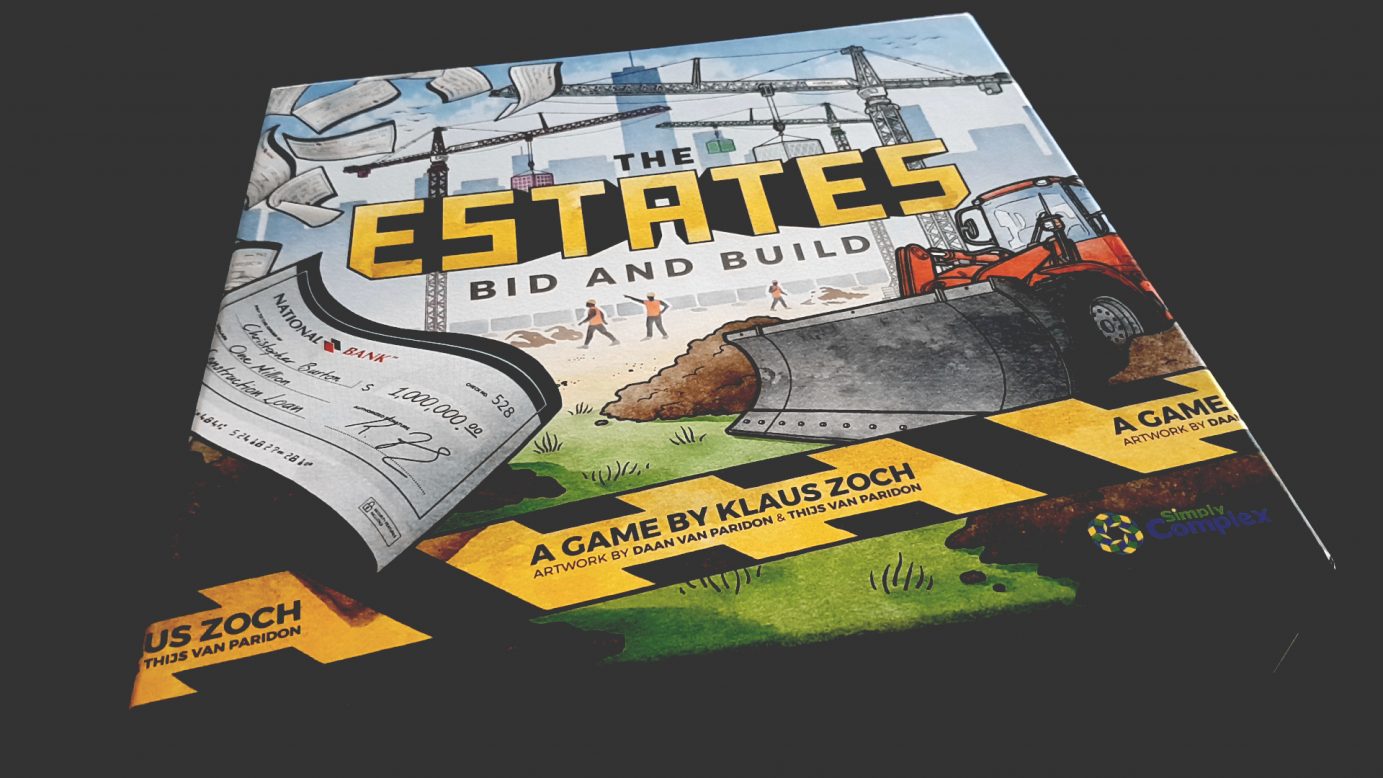
Let’s begin with a brief description of how it works.
You’re collaboratively working together on a board where you’ll be placing buildings of various value. Sometimes as single units on the grid, and sometimes in towers. The value a building has is equal to the face value of each cube in its pillar, plus the roof tile that sits atop. Every round, the active player will pick a wooden component to auction. The bid goes around once, and at the end the auctioneer has two choices. They can decide to keep the item themselves, paying the highest bidder the price they stated. Or they can give the item to the highest bidder and collect the cash offered. Everyone begins with $12m in building loans, and it’s a completely closed economy.
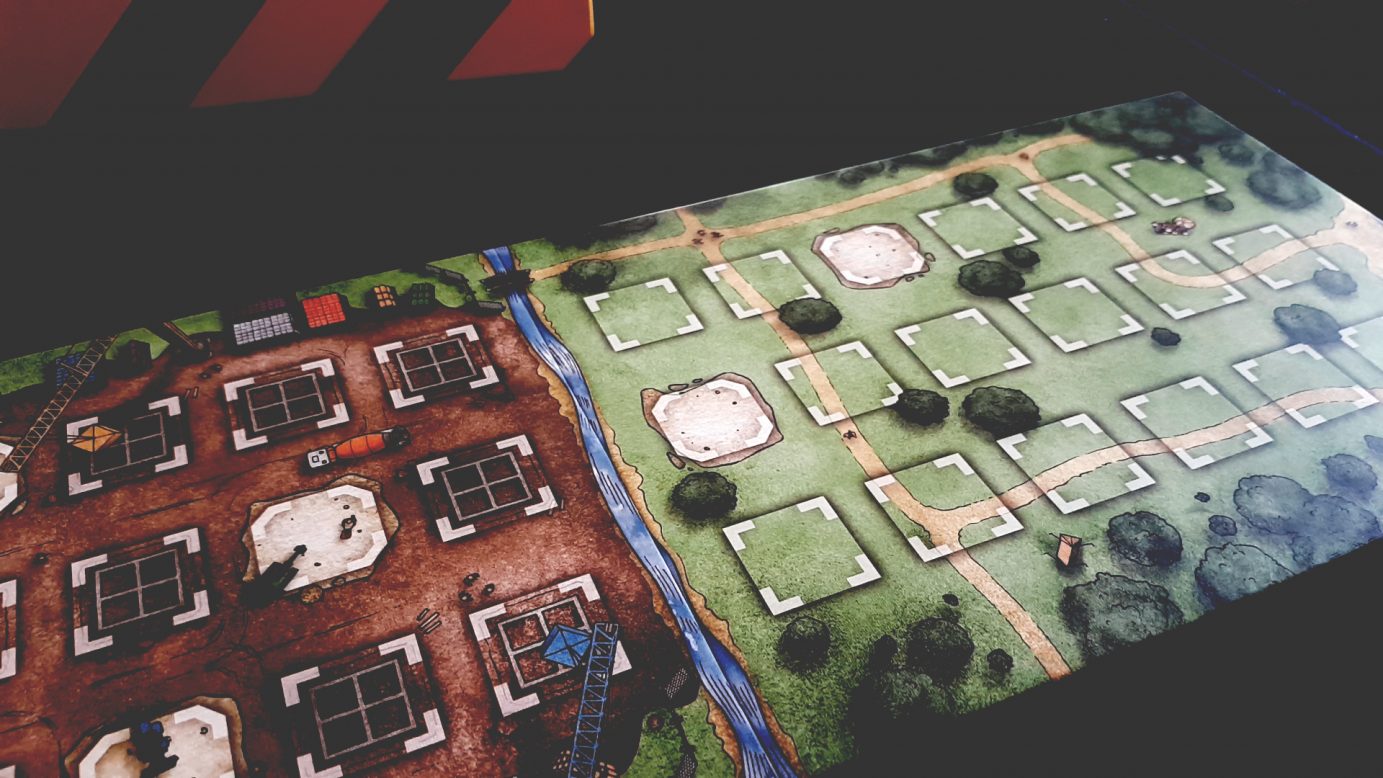
So, let’s say someone puts up a purple six for bid. It goes around the table, and someone ends up picking it up for $6m. They place it in one of the grid segments in the estate, and if they’re the first person to place a cube of that colour they also pick up the ownership certificate. From this point on, all purple buildings belong to them.
Then a green five gets auctioned. Here, the buyer can take that cube and place it in a new square of the board…
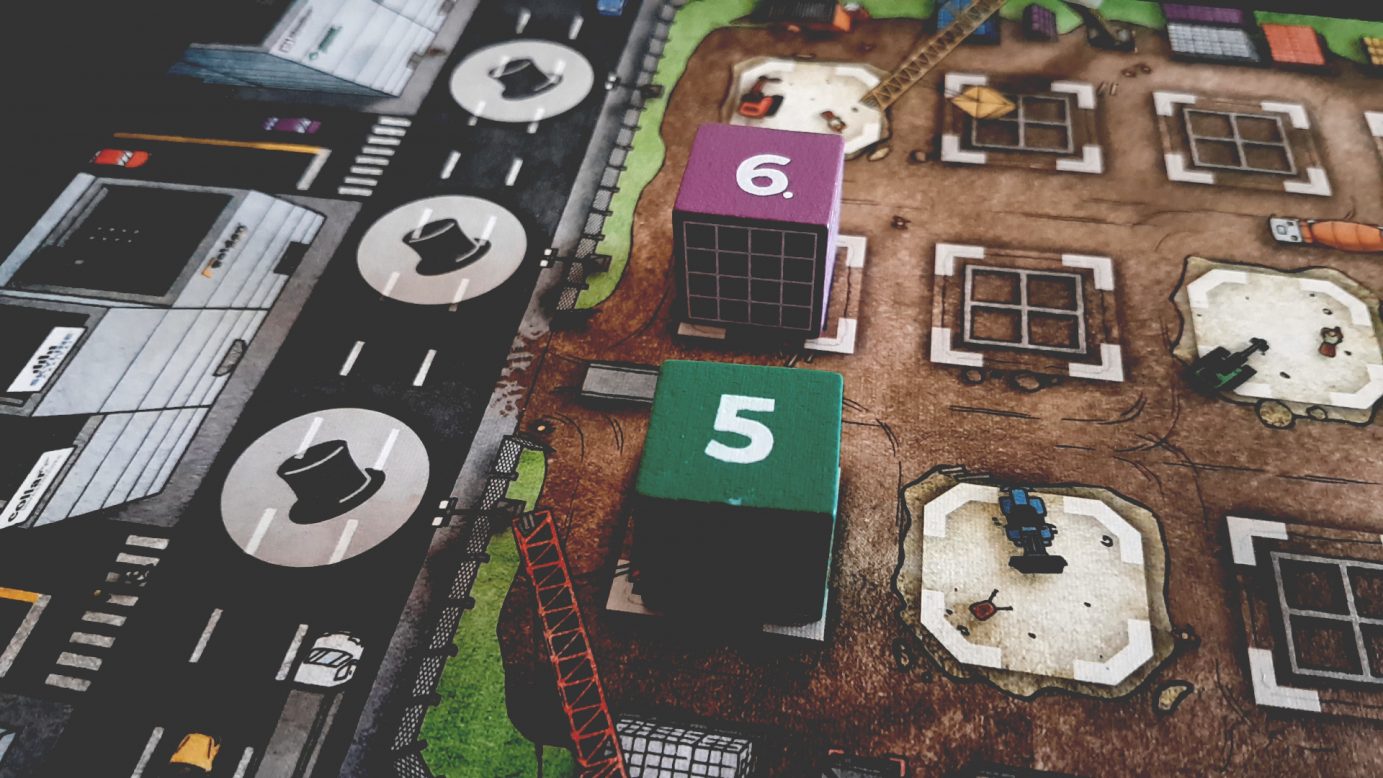
Or they can place it on top of the existing cube. Ownership of a building is determined by the colour of the cube on top, so they take ownership away from purple and claim it for themselves.
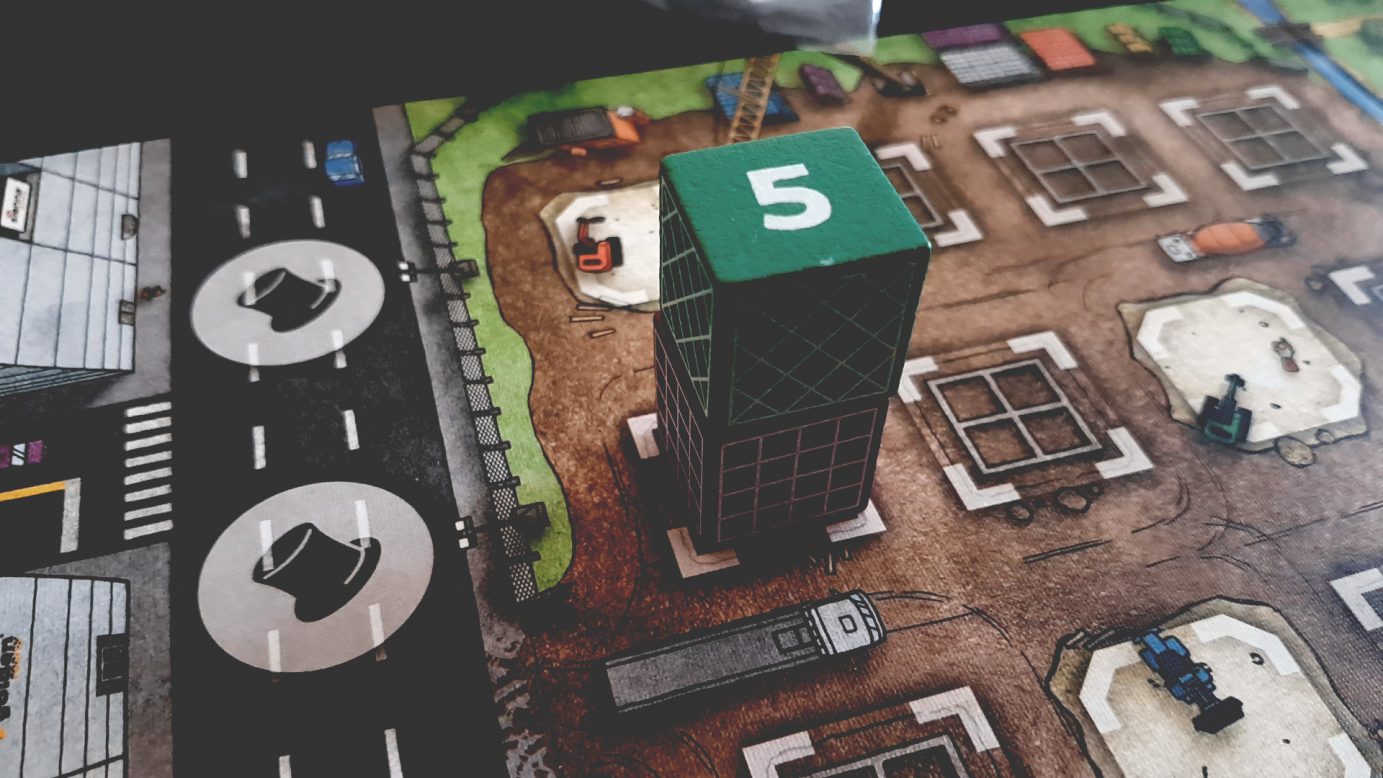
The game ends when two rows of the board are completed, which means every square in the muddy city block is filled and every building in that row has a roof. Then you count up points and declare the winner.

Except, as usual, there’s a bit more to it than that.
Here, the twist in the Estates is that if you have buildings in an uncompleted row, they’re worth negative points, and the length of a row is variable. Building contracts are available for auction and they’ll extend or shorten the requirements for a row to be completed. There’s also a one-use cancel cube that will undo a contract someone places. Finally there’s a mayor that will double the point value, positive or negative, of any one row in the game.
That’s all the pertinent information you need.
Now let’s dig down into why I think this is a borderline poisonous design for a game.

There are a lot of games on this blog that have gotten high ratings despite being intensely competitive. Brutal, even. Look at Imhotep – it’s one of the most unabashedly mean-spirited games I’ve played and it’s glorious. I don’t mind games that offer opportunities for screwing over other players, and I positively adore games that can create interesting economies where naked self-interest will result in a capitalist charnel house.
But I don’t think the Estates is a mean game. I think it’s a spiteful game, and that’s a different proposition entirely. It might seem like a mere semantic difference, and if you grabbed a random thesaurus they’d probably agree. I think though this is an existential issue.
Meanness, for me, implies a kind of low, base sordidness. Acting in one’s self interest with disregard for any nobler accomplishment. Grabbing the last life-boat off the sinking ship while others plunge to their death – that’s mean. Mechanisms that encourage meanness are exploring a rich design space, because we rarely get an opportunity to really transparently give in to that instinct in real life. Where we do, it must always be accompanied by a justifying pantomime. Society takes a dim view otherwise. The focus of meanness though is usually in self-improvement. Of wealth, of standing, and sometimes just of mercurial mood patterns.
Spite is something else though. It’s built not on a lack of edifying motivation, but the active application of lower motivation. It’s not just stealing the life boat, it’s punching holes in all the other ones. It’s not an urge to enrich yourself at the expense of others, it’s the pathological need to rob others at the expense of their dignity. This isn’t an endearing basis upon which to build a game.
And yet, if The Estates has an overriding philosophy in its design it’s in the weaponizing of spite.

It looks like someone else is going to cap off a row, so you place a building contract that massively extends the work they need to do. Someone bids on an item that you want in order to push up the price, so you give up on it and force them to buy it themselves. And then you take over one of their buildings later as a punishment. Technically you’re always acting in your self interest here, but it’s a question of emphasis. It’s a matter of motivation. A lot of the time you’re just setting yourself on fire in the hope that you catch everyone else in the blaze.
It’s possible in the Estates for example to win without owning a single building. Every round you get to slip a cheque into your illegal stash, and it’s worth a point at the end. So if you do that, and then focus on extracting the most money from everyone else you’ll end up with a positive score at the final accounting. That’s often enough to win the whole thing by itself. But in doing this you lose any meaningful stake in the outcome of the building other than ‘I need to push other people down so they don’t get to where I am’. If someone has built up an impressive real estate holding in a finished row, then maybe you want to buy their next cube and seed it into the row that’s not going to be completed. Take over, on their behalf, a tall structure that is only going to be a massive drag on their balance sheet. And then maybe you buy the mayor and set it on that row so the penalty is doubled. What do you care, you’ve no skin in the game. All you have is an incentive to screw over everyone else. It’s unbearably petty.
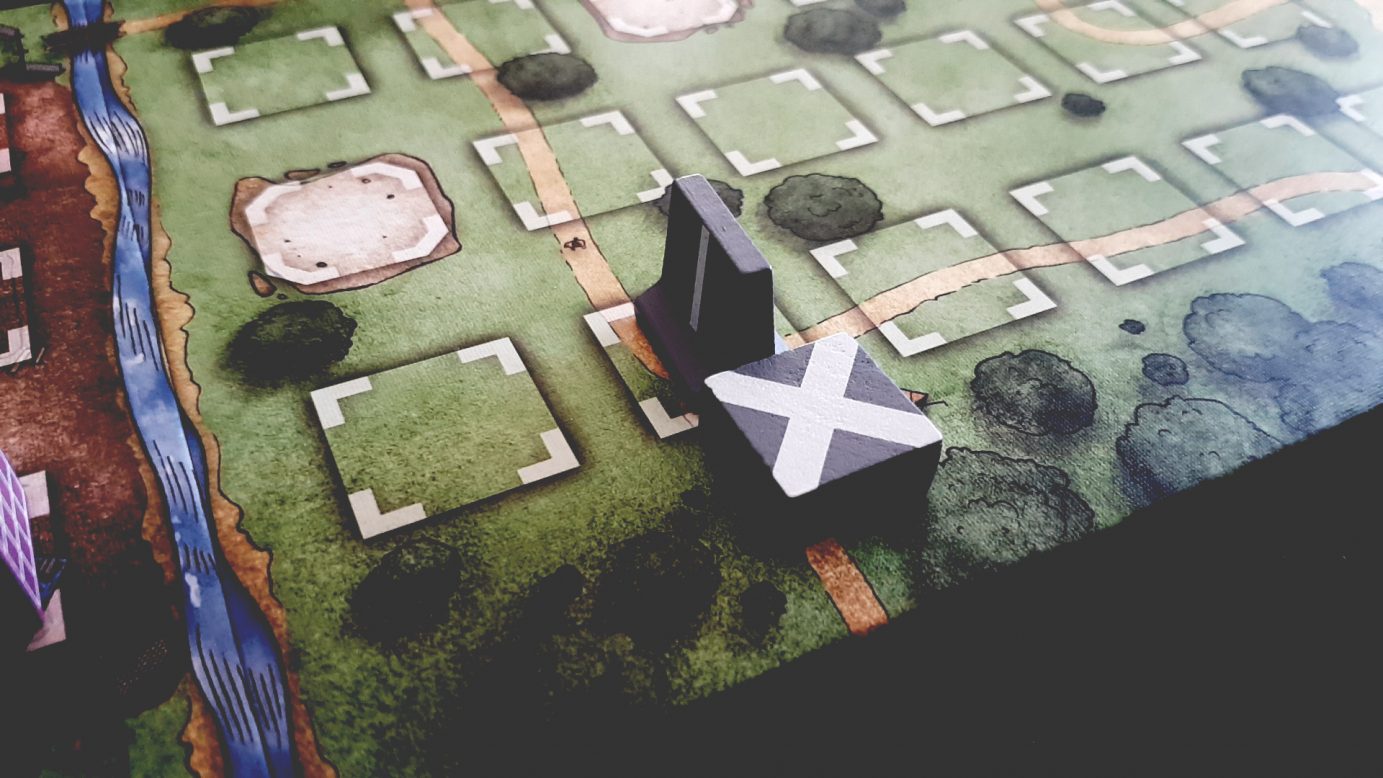
Underlining all of this is the systemic cruelty built in to the game mechanisms. A cruelty so invisible that you don’t even notice how corrosive it is. People say that The Estates is an auction game, but it absolutely isn’t. It uses the mechanisms of auctions but has a fundamentally different goal in mind. The goal of a standard incremental auction is minimise regret for everyone. It’s not a perfect system for that – human psychology gets in the way – but mathematically that’s the desired goal. The auctioneer gets the most money they can for the item they were selling, and nobody is forced into bidding more than the maximum they have to spend to acquire the item. If the auctioneer is happy with $20, and I’m the one that wants it most and I’m willing to spend $25, then that’s where the balance of the auction will live.
But look at how the auctions in The Estates work. The bid goes around once. When it gets to the auctioneer, they either buy or sell the item. Nobody gets to increase their bid. This is a system for maximising regret. Early bidders have to bid to the maximum of what they’re prepared to spend rather than being able to work their way up to from the minimum. It doesn’t even maximise value for the auctioneer, because often they won’t want the item and also won’t want anyone else to have it.
Usually here you’re not bidding on something just in terms of the value it brings to you, but rather the negative value it can bring to someone else. You’re also forced into protectionism where you’re paying, Not for advantage, but for the active negation of applied disadvantage. You’re paying money with menaces to stop yourself from being bullied. And the game is gleefully built around this as a system.

This isn’t bad, in and of itself. I don’t much care for it but I can see that it’s a rich mechanism for driving conflict, and conflict is an important part of competitive games. What makes it bad, in my view, is that this creates a game that is unbearably fragile. It’s sort of a wasted insight to say that a game depends on its group, because that’s true of every game to a greater or lesser extent. But sometimes it’s such a factor that it bears emphasis.
If even one person in a group playing The Estates isn’t entirely on board with spending hours sitting on a spiteful merry-go-round full swinging lump hammers, then the whole equilibrium of the experience swings painfully in on that person. They’ll be the easy target that magnetises the cruelty of the table. They’ll be swindled and undercut with such electric ferocity that it’s like they’re the ground in the whole system. All the pull of the negative current gets sent, inevitably, in their direction. It’s your own personal Stanford Prison Experiment. Welcome to the mouse utopia! Tuck in!
But also in this, the game becomes… well, boring. And vaguely sad. The Estates needs all the nastiness to course around the system in an endless, amplifying loop. It requires continual positive reinforcement of negative interaction so that the feedback eventually explodes in the final round of scoring. If two players are co-operating, or simply not actively undermining each other, the game becomes utterly listless. At best it becomes a playground in which one or two people try to bully the others, but nobody is getting any joy out of it.
So, if The Estates is working well as a game I find it utterly exhausting. It’s like walking down a dark alleyway in a drug-ridden scheme. It’s tiring, and not in a good way, to be constantly on the lookout for the knife that’s headed towards your back. If it’s not working, I just find it unpleasantly nasty.
In both scenarios, I don’t like how the Estates makes me feel.
But even that isn’t bad, in and of itself. I would forgive all of this if the game was actually one that gave you opportunities for this viciousness to really grow. I might even like it if created opportunities for cleverness and rewarded you for finding them. But it doesn’t, because in the end mostly what defines the Estates is anarchy and cruelty. It’s so ridiculously swingy because the delta between winning and losing will flip with every single placement. There are moments where people can make smart plays, but they’re usually so easily undone or redirected that there’s no real point. Sure, you just took my valuable building away from me. But look, I just extended that row so that it’s a space longer than before. Oh, you cancelled that? I only extended it so you would, now I’m extending it three! Oh no, now you’ve put one of my cubes in that row, so our fates are bound together! So then I’ll…
And so on, and so on, and so on, and so… on…
It just feels meaningless. All accomplishment is temporary. All positive momentum will be redirected into a future penalty. You can’t take joy in what you’ve built because it’s only a matter of time before someone comes along and kicks that sandcastle into your face.
At the end of a game evening I want to feel good. I want to reflect fondly upon the time I just spent. The Estates, fundamentally, doesn’t give me reasons to do that. The Estates works well for what it is – a game of dicking people over until the final dick has been dicked. But fundamentally what it undoubtedly achieves in its design is just something of which I want no part. I appreciate the skill that goes into engineering the absolutely perfect mugging, but that doesn’t mean I want to be a participant in the event. Don’t get me wrong – some people will love the energy this game brings to the table. I’m just not one of them.
